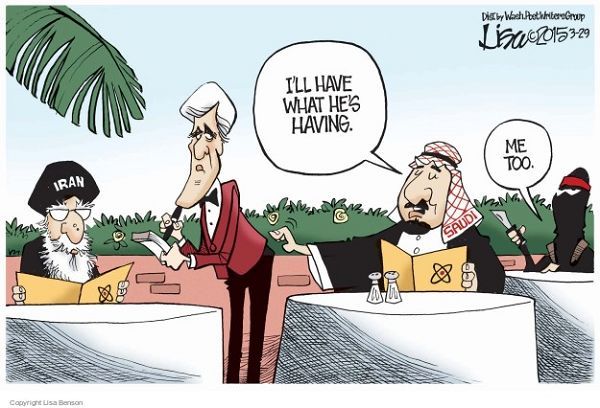
The dangerous escalation between Tehran and Riyadh, essentially motivated by considerations of internal politics, is potentially explosive for the Middle East. It is Washington’s duty to restore peace.
In the ’70s, the day after Richard Nixon’s trip to China, there was talk about the Washington-Moscow-Beijing triangle. Today, in the Middle East, there exists another triangle between Riyadh, Tehran and Washington. The obstacle to stability in the region is that this triangle is perfectly dysfunctional. Indeed, we cannot understand the dangerous escalation that Saudi Arabia and Iran have given themselves over to without focusing on the role, or rather, in this case, the relative effacement of the United States.
While America no longer depends on the Middle East when it comes to energy, Saudi Arabia behaves like a free radical in its relations with Washington. At the very least, one could describe it as a move into autonomy that’s not going very well. Just yesterday, Saudi diplomacy combined a “generous checkbook and low profile.” Riyadh moved, if not secretly, at least cautiously. Today, Saudi Arabia seems to want to compensate for the weakness of its financial resources with audacity and visibility in its initiatives. By executing the Shiite Sheikh Nimr al-Nimr, Saudi Arabia took the risk of inflaming its relations with Iran and beyond that, the rest of the Shiite world. Saudi Arabia did it deliberately, and above all for reasons of internal politics. For Riyadh, it was about deflecting the people’s attention at a moment when the dizzying (and probably long-lasting) fall of the price of hydrocarbons means that the country can no longer continue to buy social stability with important subsidies for its population as it was doing, for example, at the beginning of the Arab Spring. But to play the religious and sectarian nationalism card to the point of flirting with war – real, as in Yemen, or potential, as with Iran – is always a dangerous undertaking for a fragile regime. Could the Saudi regime one day experience the same fate as the Second Empire in France or the Austro-Hungarian Empire, which did not survive military defeat?
Riyadh’s flight forward is also explained by personal motivation. It would be an understatement to say that no Kissinger exists (at least not anymore) in the Saudi Dynasty’s court. Prince Saud, who directed the kingdom’s diplomacy for 40 years, has not found a worthy successor. With a political system whose principles are vitiated and whose legitimacy is weakened by a religious practice which, seen from the outside at least, does not seem so different from that of the Islamic State, Saudi Arabia seems to use its obsession with Shiite Iran as its identity’s driving force. For France, which has been playing the Saudi card for years, the evolution of Riyadh’s behavior is problematic.
What relationship should one have with an ally that behaves irresponsibly, over which one has no real influence and which is as much the cause of a region’s problems as it is a shield from the risk of chaos? If Riyadh is not listening to Washington anymore, why would it attach any importance to suggestions from Paris?
If Saudi Arabia’s responsibility in the escalation we see today is glaring, Iran is far from irreproachable. In matters of human rights, Tehran has no lessons for Riyadh. In 2015, Iran executed many more people (around 1,000) than Saudi Arabia. Iranian conservatives have seen in the Saudi provocation a convenient pretext for questioning – with an unacceptable action, the ransacking of the Saudi Arabian embassy in Tehran – what little progress has been made since the signature of the agreement on nuclear power by the moderate camp that backs President Rouhani.
In fact, the Islamic State group is the sole beneficiary of the escalation set in motion by Saudi Arabia and exploited by a part of the Iranian regime. It is a paradox. At the moment when the terrorist organization sees the territories it controls progressively shrinking, it benefits from a divide between its adversaries. How can we hope that the talks underway in Vienna on Syria’s future will make any progress when the two main participants, Saudi Arabia and Iran, are playing with fire and have each made it their priority to weaken the other and not the so-called Islamic State group? If Riyadh and Tehran will only speak to insult one another from now on, compromise has become impossible throughout the region.
In reality, it is convenient to go back to the triangle formula. The United States is unable and unwilling to choose between Saudi Arabia and Iran. However, it is the only one which may still be able to contribute to the re-establishment of some form of dialogue between Riyadh and Tehran. The majority of Iranians support their country’s opening up to the world, which, logically, should accompany the signing of the agreement on nuclear power. Saudi Arabia has felt abandoned, if not betrayed, by an America that it understands less and less since the war in 2003 in Iraq, in which there was only one victor, the Iran of the mullahs and, beyond that, the Shiite cause. This feeling persists within many Saudi leaders as a survival instinct. To denounce America’s irresponsibility is one thing; to practically hurry it into Iran’s arms is another. America must exercise all available means of exerting pressure to prevent Saudi Arabia and Iran from continuing to flirt dangerously with war.

As long as it stays non-nuclear, war between Iran and Saudi Arabia would further drop the Middle East into chaos, not necessarily a bad thing, since it would allow a Western takeover of MidEastern oil “to save the world economy.” Failed states turn into a failed region. Not that far off, all things considered.
The word you want is realpolitik. What other region is currently exporting terrorism?